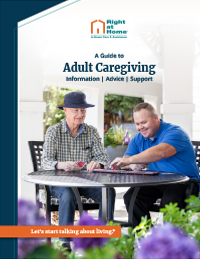

Warning Signs That Your Loved One's Needs Are Changing
It’s difficult to watch your parents and loved ones age. These people have been steady in your life and have nurtured and guided you through the years. As your parent or other loved one ages, you start to see a shift from them being your protector to needing your attention and protection. The signs that care needs are changing may start subtly, but these signs indicate that your loved one needs extra care and support.
Let’s start talking about living.®
6 Signs Your Loved One Needs Caregiving Help
- Forgetting or having difficulty recalling information.
We all forget things from time to time. However, red flags for concern include feeling confused, getting lost in familiar surroundings, forgetting the month or year, repeating recent conversations, or having a more difficult time having a conversation. - Neglecting personal care, including hygiene, mobility and nutrition.
Does your loved one have trouble getting dressed or bathing, walking to get the mail, or making a meal? Pay attention to your loved one’s appearance. You may see signs that they are having trouble with daily living activities. Uncleanliness, malnutrition, weight loss and a sedentary lifestyle can lead to a decline in health and wellness and quickly escalate to more serious illnesses or injuries.
- Withdrawing from social interactions or relationships.
Has your loved one given up hobbies or made excuses to avoid family gatherings and other social activities? Pulling away from previous social connections can lead to isolation, loneliness and depression. - Mismanaging finances or not paying bills.
It’s not always easy to spot declining financial capacity. Some early warning signs include piles of unopened bills, missed payments, new interests in investments or get-rich-quick schemes, major purchases or donations, and any struggles with interpreting financial documents.
- Displaying unusual behavior, such as being overly quiet, loud or agitated.
Things that were once easy to do now may require more physical and mental effort. This can take an emotional toll on your loved one, and they may express their emotion through aggression, anger, impulsivity, inappropriate comments, or withdrawal. - Struggling with household chores.
When household chores become too difficult, they are neglected. You may notice piles of dirty laundry, unclean kitchens and bathrooms, barely stocked pantries, trash accumulating inside and outside the home, and an overgrown lawn and garden.
Adult Caregiving Guide
Recognizing your loved one needs caregiving can be an emotional moment for both of you. It is not always easy to know where to start. Download the free Adult Caregiving Guide from Right at Home that includes a Needs Assessment Worksheet along with helpful information, tools and resources to help determine the right time to seek additional or professional help for your loved one’s daily needs.

Download the Adult Caregiving Guide
What To Do When Warnings Signs Appear
If your loved one is showing some or all of the signs above, it is time to consider additional caregiving support. This may be from family, friends, or hired in-home caregiving support. Here are some next steps to help guide you in seeking the extra care and assistance your loved one requires.
- Accept assistance. Caring for a loved one while managing work, family and other life responsibilities can be overwhelming. There are many free or economical public and private services for adult caregivers seeking respite from providing continuous care.
- Talk with your loved one to find out what they need and what they will accept.
- Watch for warning signs of declining abilities, such as changes in grooming, eating, or social activities. This will tell you when you may need to add caregiving support.
- Contact your loved one’s health care provider for an evaluation of cognitive function if you notice what appears to be a decline in thinking and reasoning.
- Track your loved one’s health and wellness. Document changing health conditions and questions and answers with your loved one’s health care provider and all medical prescriptions and over-the-counter health products to help you manage your loved one’s health.
- Establish a support network of friends, relatives, neighbors, caregivers, and support groups, and keep in touch.


